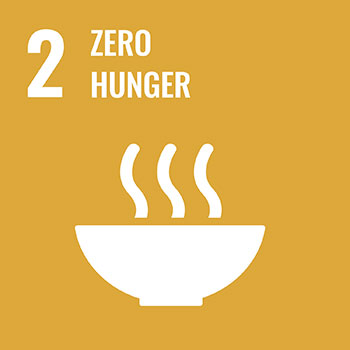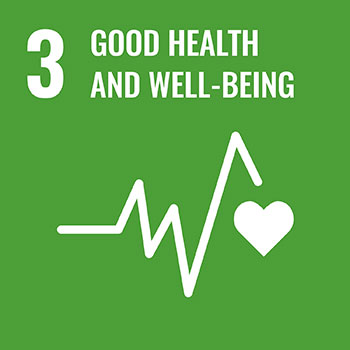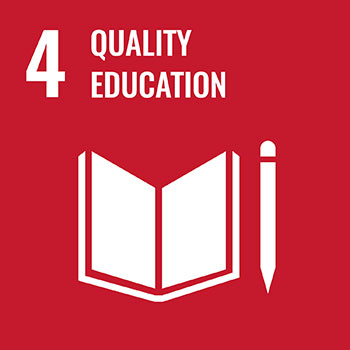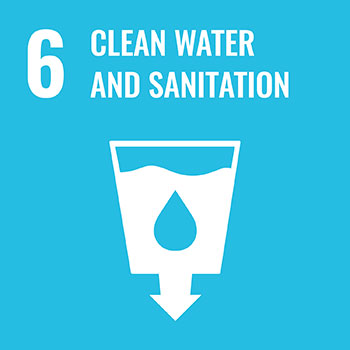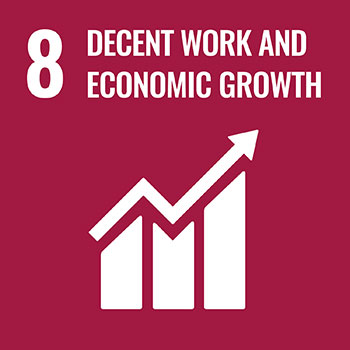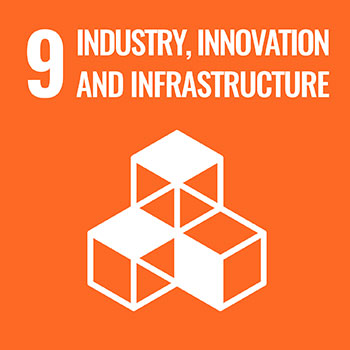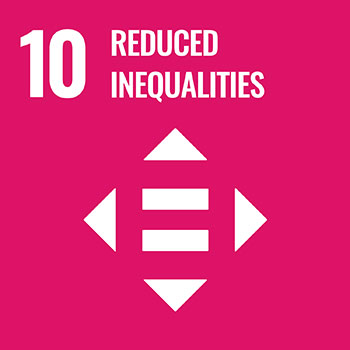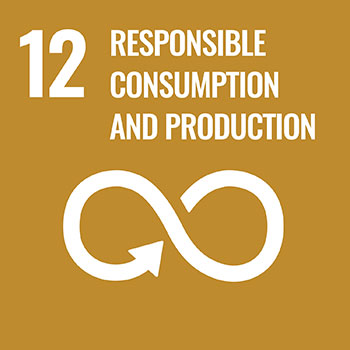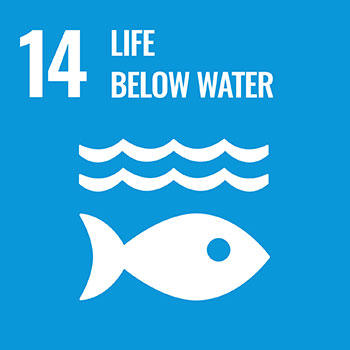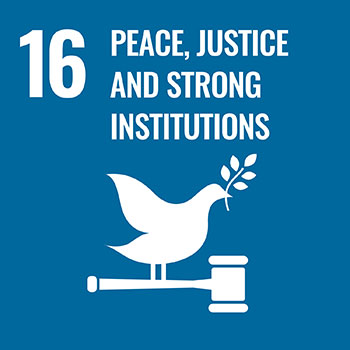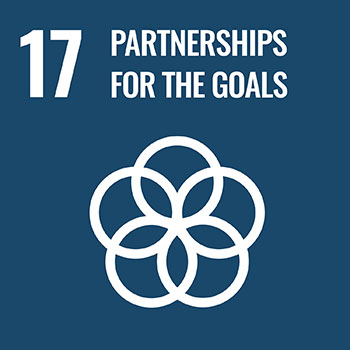Search for academic programs, residence, tours and events and more.
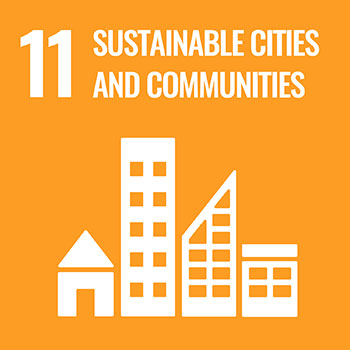
Make cities and human settlements inclusive, safe, resilient and sustainable.
Wilfrid Laurier University engages in a range of initiatives to make cities and human settlements inclusive, safe, resilient and sustainable. By advancing SDG 11, we play a role in enhancing the quality of life for those in our local communities and beyond.
The work that Laurier completed in 2023 to advance SDG 11.
Kitchener-Waterloo residents and policymakers saw homelessness through a new lens at a photography exhibit called Falling Through the Cracks: Voices of Displacement in Waterloo Region. With the support of Laurier researchers, people with lived experiences of homelessness captured their perspectives through imagery.
As part of a pilot program with the Region of Waterloo, Laurier has partnered with Neuron Mobility to provide community members with additional and sustainable options for travel to and from campus. Use of the e-bikes and e-scooters will contribute to reduced greenhouse gas emissions and traffic congestion.
Social Innovation in the City, offered through Laurier's Faculty of Arts, provides students with hands-on opportunities to research, design and test social and policy innovations to make a positive impact in the City of Waterloo. Throughout the course, students have access to an advisory group of experts at the City of Waterloo and Laurier, as well as community experts and partners. At the end of the course, student solutions are presented to stakeholder groups during an in-person event at Waterloo City Hall.
Erin Dej, an assistant professor of Criminology, and Laura Pin, an assistant professor of Political Science, are both actively seeking solutions to homelessness through their research. Dej works alongside people with lived experience to study homelessness and social exclusion, including the criminalization of homelessness. Pin’s research examines how social inequality intersects with public policy, including housing policy.
Renowned Métis artist Tracey-Mae Chambers brought her artwork that explores decolonization in the pursuit of Truth and Reconciliation to the Robert Langen Art Gallery at Laurier’s Waterloo campus in the exhibition #hopeandhealingcanada.
Members of Laurier’s executive leadership team were among 60 staff, students, faculty and community members who rolled up their sleeves and put brush to canvas during a collaborative painting session as part of the Laurier Library Indigenous Mural Project.
Renowned hip hop artist and Laurier alum Shad (Shadrach Kabango), a Rwandan-Canadian rapper with an illustrious career spanning seven full-length albums and three EPs since his debut in 2005, returned to Laurier for an exclusive residency.
As an Anishinaabe composer, singer and educator, Barbara Assiginaak teaches composition at Laurier and creates music that reflects her culture and heritage. She is also a dedicated supporter of truth and reconciliation efforts in Canada. On the National Day of Truth and Reconciliation, she premiered a new piece commissioned by Salle Bourgie and FIL in Montréal.
Laurier teamed up with SpacesShared, an online platform that pairs students looking for affordable accommodations with older adults who have extra space in their homes. The partnership will create new housing options for Laurier students in Waterloo and Brantford and give older adults a way to leverage a spare bedroom for some extra income, company and assistance around the house.
Laurier research centres advancing SDG 11.
The Viessmann Centre for Engagement and Research in Sustainability (VERiS) is an interdisciplinary and community-engaged research centre striving to be a catalyst and nexus for the transition toward strong cultures of sustainability. The centre understands cultures of sustainability “as characterized by shared values, symbols, rituals and practices grounded in sustainability principles leading to individual and societal choices that promote environmental protection, social justice and well-being, and a supportive economy." A culture of sustainability may exist within an organization, a building with multiple organizations or a community.
The Laurier Centre for the Study of Canada (LCSC) focuses on the interdisciplinary, multidisciplinary and comparative study of the Canadian experience. LCSC has three objectives:
In pursuit of this mission, LCSC recognizes there are expansive, evolving, and contested interpretations of Canada.
The Laurier Centre for Music in the Community (LCMC) was formed with a mission of connecting Laurier to the wider Waterloo Region community through musical activities, community research and collaboration. The LCMC lives out this mission through research, symposia, publishing, projects, partnerships and concerts. Using music as a conduit, it works to connect community, collaborate with music-makers, and contribute to the vitality of music and people.
Laurier initiatives in 2023 that advanced SDG 11.
All buildings, monuments and natural heritage landscapes on all Laurier campuses and locations are free and open to the public. Laurier is home to 11 heritage buildings, including the Carnegie Library Building and the Lucinda House.
Community members can take self-guided tours of the campus. To support accessibility, free virtual tours are also available.
The Laurier Library provides access to 1.3 million online resources and holds one million print resources that can be accessed through the library’s Omni search system. Community members are welcome to freely access the Laurier Library and borrow books from the library free of charge.
Laurier’s Robert Langen Art Gallery (RLAG) is the university’s visual arts centre and is open to the public for free. RLAG oversees art collections and Laurier’s multicampus milieu and organizes visual arts programming that inspires, challenges and expands learning beyond the classroom. Working with a wide range of university and community partners, the gallery develops exhibitions, artist lectures and arts-related events featuring practitioners who range from students and community members to leading national and international visual artists.
Laurier’s Archives and Special Collections are open to the public. The collecting emphasis is on Laurier, the environmental conservation movement in Canada, the Evangelical Lutheran Church in Canada and its Eastern Synod, music in Kitchener-Waterloo and the history of Waterloo Region. Appointments are not necessary to visit. Laurier Archives and Special Collections staff are happy to provide instruction sessions and tours of the archives.
Laurier's Waterloo campus has five hectares of land that is accessible and connected to the surrounding community through unrestricted municipal vehicle and pedestrian infrastructure. Presently, green space covers 30% of the campus and an ‘urban forest’ runs throughout the campus that members of the community are welcome to enjoy. The campus features a large, 14,000 sq. ft. community garden. Woven into the community garden plots at the Northdale Community Garden is an edible forest featuring fruit trees bearing a variety of apples, pears and service berries.
Community members can take self-guided bike or walking tours of the campus. To support accessibility, free virtual tours are also available.
The Laurier Faculty of Music is host to a variety of events, including more than 100 publicly available concerts, recitals, guest workshops and other community events. Home to the Maureen Forrester Recital Hall and the Theatre Auditorium, the performance halls host thousands of guests each year.
The public can also engage with Laurier ensembles and faculty performances from the comfort of home by streaming past concerts on our Faculty of Music YouTube channel.
Laurier is working locally, nationally and internationally to help preserve cultural heritage. For example:
Through its Sustainability Action Plan, Laurier has established a number of targets for more sustainable commuting. These are measured through an annual survey and by tracking annual commuter and travel data from department and faculty budget expenditures. Targets set include:
Laurier, in partnership with the Region of Waterloo’s TravelWise program, conducts an annual Alternative Transportation Survey to measure and improve sustainable commuting practices. The survey results help the Sustainability Office, Parking and Transportation Resources, and Sustainable Waterloo Region gain valuable insights into student transportation patterns and identify areas for promoting more sustainable, eco-friendly commuting options, including carpooling, public transit, and cycling.
Survey participants were asked a range of questions, including their preferred modes of transportation, familiarity with Grand River Transit (GRT) discount options available to staff, and the challenges they face when considering alternative commuting options such as cycling, carpooling, or public transit. Demographic data was also collected to provide a comprehensive understanding of travel behaviours across different groups within the Laurier community.
The survey results offer valuable insights into how Laurier can enhance its transportation strategies, promote sustainable travel choices, and reduce barriers to adoption, such as lack of infrastructure or convenience, aligning with broader campus sustainability goals.
Laurier offers a variety of programs and initiatives to promote and support a safe and environmentally friendly commute to campus:
Laurier is committed to providing a living wage for all employees to account for the local living costs in the cities where our campuses are located. To support the high costs of relocating to our region, Laurier provides financial aid in the form of moving and relocation reimbursement. In addition, employees have access to rent short or long-term housing and accommodations on the Waterloo campus and in our Yellowknife location.
Laurier is committed to evaluating housing options for members of its community. The institution is a member of the local Town and Gown committee, which seeks to enhance relationships, communications and policies among the universities, the community and the city. The committee evaluates a number of issues, including housing. The committee produced an accommodation report in 2023.
Laurier’s Student Life units oversee and evaluate housing options for students both on and off campus. Laurier provides various affordable on and off-campus options, including dormitories and apartments.
In addition, Laurier has partnered with Places4Students.com, an off-campus housing website that specializes in providing students, schools and landlords with a quality rental property listing service. The institution recently formalized a partnership with SpacesShared, an online platform that pairs students looking for affordable accommodations with older adults who have extra space in their homes. The partnership will create new housing options for Laurier students in Waterloo and Brantford and give older adults a way to leverage a spare bedroom for some extra income, company and assistance around the house.
Laurier also offers financial aid for students to assist with costs associated with housing.
Laurier is committed to evaluating housing options for members of its community. The institution is a member of the local Town and Gown committee, which seeks to enhance relationships, communications and policies among the universities, the community and the city. The committee evaluates a number of issues, including housing. The committee produced an accommodation report in 2023.
Laurier prioritizes pedestrian access on campus through the provision of multi-use paved walking and cycling paths connected to the city pathway system, which provide safe and reliable paths for the community year-round. The university's interconnected pathway system can be seen in Laurier's interactive maps.
Laurier is helping to address the affordable housing crisis in Canada. Our faculty and students are working on developing innovative solutions and supporting their local communities.
As outlined in our Sustainability Policy, Laurier is committed to maintaining sustainability design standards for major projects that will enable the university to work toward LEED green building standards for new builds and introduce principles of sustainable construction, renovations and landscape design, making use of full cost cycle accounting. For example:
Laurier has strategically expanded its building portfolio by retrofitting brownfield building sites, particularly on the Brantford and Waterloo campuses. Through adaptive reuse, the university has revitalized historic structures and former industrial sites, transforming them into vibrant academic spaces. This approach aligns with Laurier’s commitment to sustainability, blending heritage conservation with modern functionality. The Brantford campus exemplifies this through its repurposing of downtown landmarks, while the Waterloo campus continues to integrate sustainable development into its growth strategy.
Discover how Laurier is contributing to United Nations Sustainable Development Goal targets.

